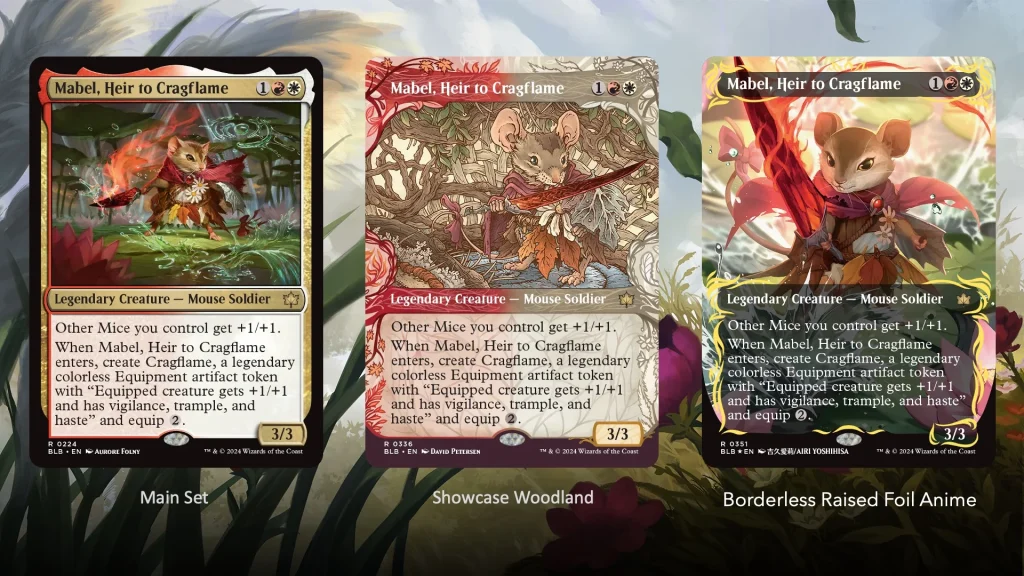The Future of Magic Text—Simplified, Abbreviated, and Maybe Too Much?

Starting with Bloomburrow, Magic: The Gathering has officially shortened one of its most iconic phrases: “When this creature enters the battlefield” is now simply “When this creature enters.” The battlefield? Implied. This change is part of a broader trend of condensing card text, a move Wizards of the Coast says is necessary to accommodate increasingly complex designs. Let’s break it down—and maybe have a little fun with how far this could go.
Why Shorten the Text?
Magic cards are more intricate than ever. Gone are the days when a commander just drew cards or made tokens. Now, they do everything but your taxes, and the text boxes are feeling the strain. Wizards has decided that trimming unnecessary words is the best way to make room for these flashy, multi-functional designs.
And look at all the newfound space! We’ve got bigger text, more mechanics, and value-packed cards that practically scream, “Look at all I can do!” But today’s not about critiquing these changes—it’s about helping Wizards take this idea to the next level. You’re welcome, Wizards of the Coast. Let’s optimize that text box even further.
Let’s Trim the Fat
Take Byrke, Long Ear of the Law, for example:
- Current Text: “Vigilance. When Byrke, Long Ear of the Law enters the battlefield, put a +1/+1 counter on each of up to two target creatures. Whenever a creature you control with a +1/+1 counter on it attacks, double the number of +1/+1 counters on it.”
Okay, that’s a mouthful. Let’s clean it up:
- Simplified: “Vigilance. When Byrke enters, put a +1/+1 counter on up to two creatures. Whenever your creature with a counter attacks, double those counters.”
See? It says the same thing with fewer words. Why repeat “Byrke, Long Ear of the Law” when it’s clear what you’re talking about? And why waste space on “each of” or “a creature you control”? Magic players know what’s going on—we don’t need a novel.
More Space for Abilities
Look at all the room we just freed up! We could slap a fourth ability on Byrke. Maybe it flips into a saga. Maybe it gains Ward 2 because, hey, we know you love that, Wizards. Or let’s make it a creature, a planeswalker, and a vehicle all at once. The possibilities are endless when you cut a few words here and there.
Tokens? We Don’t Need to Define Tokens
Here’s another easy fix: stop explaining what tokens do. By now, we all know what a Treasure token is. Most of us don’t even have the official tokens anyway. We just write “Treasure” on a scrap of paper and call it a day. So why are we wasting text space on something everyone already understands?
Take this hypothetical card:
- Current Text: “When this creature enters the battlefield, create a Treasure token. (It’s an artifact with ‘Tap, Sacrifice this artifact: Add one mana of any color.’)”
- Improved Text: “When enters, make Treasure.”
Boom. Cleaner. Faster. More efficient. Let’s move on.
Streamlining Keywords
Keywords are the next frontier. Why spell out “Vigilance” when we could just say “Vig”? “Trample” becomes “Tram,” “Flying” is just “Fly,” and “Lifelink” becomes… well, “Link.” Let’s shorten “When this creature enters the battlefield” to just “Enters.” And why bother with “plus one plus one counters” when “pluses” gets the job done?
Here’s Byrke 2.0:
- Text: “Vig. When enters, put pluses on two. When yours with pluses attacks, double them.”
Crystal clear, right? You know what’s happening. Magic players are smart. We can handle it.
Zones? Too Many Letters
Let’s talk about zones. “Battlefield”? Too long. Let’s call it “Field.” “Graveyard” is now “Yard.” “Library” becomes “Deck.” We’re just cutting vowels at this point. Why stop there? Early 2000s internet lingo gives us all the abbreviations we need. Your turn? “YT.” Opponent’s turn? “OT.” Main phase? “MP.” Now we’re cooking.
Imagine a modern card:
- Old Text: “At the beginning of your opponent’s end step, if you control a creature, you may draw a card.”
- Streamlined: “Op end: if creature, draw.”
Look at all the space we saved! That’s room for two more mechanics, a QR code, and maybe a TikTok link.
The Ultimate Solution
Why stop at text? Let’s eliminate it entirely. Imagine a world where Magic cards are just blank with a QR code. Want to know what the card does? Scan it with your phone. This approach saves printing costs and lets us design cards with infinite complexity. You could have a card that changes every turn, a card that updates weekly, or a card that downloads a podcast explaining how it works. The future is digital, and Magic is ready to embrace it.
Closing Thoughts
Sure, all this might take some getting used to. Players might balk at textless cards or keywords like “Tram” and “Vig,” but they’ll adapt. After all, we’ve already accepted sticker sheets, Universes Beyond, and cards where the text is too small to read anyway. Why not go all-in on simplification?
The future of Magic: The Gathering is sleek, efficient, and maybe a little incomprehensible. But that’s okay. We’ve got phones. We’ve got patience. And we’ve got a love for this game that no amount of abbreviations can take away.
Magic is evolving. Are you ready?
Share this Post
Recent Posts
- How Popular Is Lorcana in 2026? A Reality Check
- Buying MTG Proxies Safely: Red Flags and Payment Safety Basics
- MTG Commander Card Draw: How Many Sources Is “Enough”?
- MTG Proxies on SpellTable: Camera Readability, Glare, and Practical Fixes
- MTG Commander Ramp Mistakes: When “More Ramp” Makes Your Deck Worse
Product Categories
ProxyMtG@protonmail.com
